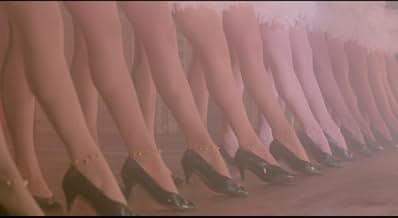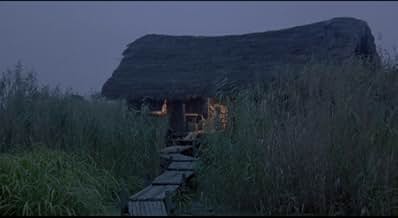CALIFICACIÓN DE IMDb
7.1/10
6.3 k
TU CALIFICACIÓN
Agrega una trama en tu idiomaA provincial boy related to a Shanghai crime family is recruited by his uncle into cosmopolitan Shanghai in the 1930s to be a servant to a ganglord's mistress.A provincial boy related to a Shanghai crime family is recruited by his uncle into cosmopolitan Shanghai in the 1930s to be a servant to a ganglord's mistress.A provincial boy related to a Shanghai crime family is recruited by his uncle into cosmopolitan Shanghai in the 1930s to be a servant to a ganglord's mistress.
- Dirección
- Guionistas
- Elenco
- Nominado a 1 premio Óscar
- 5 premios ganados y 4 nominaciones en total
- Dirección
- Guionistas
- Todo el elenco y el equipo
- Producción, taquilla y más en IMDbPro
Opiniones destacadas
Here's something you don't see every day - a mobster movie that focuses on the evil of criminals, instead of their coolness. "Shanghai Triad" shows you how mob violence destroys the life of a gangster's moll and endangers her innocent, fresh-from-the-country servant. It's exactly the kind of story you wouldn't see in a Hollywood movie - which is, I suppose, why we watch this weird foreign stuff!
Gong Li is, as ever, forceful and compelling, with a role that's infinitely more interesting than what America's "lead" actresses usually get. She's very glamorous here, and totally unlike the peasant characters she played in "To Live" and several other films. What a wonderful, versatile actress.
The film's other strengths include gorgeous, award-winning cinematography, interesting point-of-view shots, and an effective shift from an urban to a country setting that's pulled off very smoothly. It's a shame that this is the last film that director Zhang Yimou and Gong Li made together, but at least it caps off their collaboration on a high note.
Gong Li is, as ever, forceful and compelling, with a role that's infinitely more interesting than what America's "lead" actresses usually get. She's very glamorous here, and totally unlike the peasant characters she played in "To Live" and several other films. What a wonderful, versatile actress.
The film's other strengths include gorgeous, award-winning cinematography, interesting point-of-view shots, and an effective shift from an urban to a country setting that's pulled off very smoothly. It's a shame that this is the last film that director Zhang Yimou and Gong Li made together, but at least it caps off their collaboration on a high note.
First of all, I'm a huge fan of Gong Li.
"Shanghai Triad" one of my favourites out of her movies. 'Favourite' in my definition applies only when I want to watch a film again and again and liking it more everytime I watch it.
"Shanghai Triad" is a beautiful movie, with a clever plot developed within the time frame of a mere seven days. The depth of character also adds to the brilliance of the film. The character of "Xiao Jingbao" (sometimes translated as "Bijou") played by Gong Li at first seems shallow, as she is a chanteuse and moll of a powerful gangster. As her character develops, one recognises that underneath her materialistic values imposed upon her by society, lies a very pure nature. The discovery of the depth of her characterisation is especially moving, and propels towards an emotional climax, during which tragedy arouses sympathy and anguish.
The little boy in the movie is also noted for his excellent performance. He silently dominates the atmosphere of the film, looking on without speech, but secretly and strongly decided in the mind. He acts as the eye through which we see the world in the movie.
Apart from all the technical approval and standardised appraisal of the movie, I have to add I also loved Gong Li's singing in the movie. Yes, it was actually her singing! Her singing is just as beautiful as herself and her performances. Watch her dance and sing elegantly on stage, not one moment has she been not charming in the movie.
On the director's part, this is a very different film from all other previous Zhang Yimou films. But like all his other films, the story is meaningful and the cinematography is breath-taking.
Some more little background facts about the movie: during the making of the film, neither Gong Li nor director Zhang Yimou was in particularly good mood. And that was because, if you know about Gong Li and Zhang Yimou's relationship before, they broke up. Reason? Well, in short, Zhang Yimou's a workaholic, and Gong Li like any other woman, wanted security and family which he was unable to give. And interestingly, and sarcastically (in our point of view), there was a scene in the movie where Gong Li was chatting with the woman peasant. The peasant thought Gong Li was already married, but she said no. With surprise, the peasant said by this age she should be getting married. Gong Li said "Yes, I should be getting married. But do I know who to get married to?"
Of course Gong Li is married now, to a Singaporean business man.
Getting back to the movie, it's just a classic. It's visually absorbing, narratively ingenius, audibly satisfising, emotionally powerful, and just speechlessly amazing. If one can love a movie, I love this movie.
"Shanghai Triad" one of my favourites out of her movies. 'Favourite' in my definition applies only when I want to watch a film again and again and liking it more everytime I watch it.
"Shanghai Triad" is a beautiful movie, with a clever plot developed within the time frame of a mere seven days. The depth of character also adds to the brilliance of the film. The character of "Xiao Jingbao" (sometimes translated as "Bijou") played by Gong Li at first seems shallow, as she is a chanteuse and moll of a powerful gangster. As her character develops, one recognises that underneath her materialistic values imposed upon her by society, lies a very pure nature. The discovery of the depth of her characterisation is especially moving, and propels towards an emotional climax, during which tragedy arouses sympathy and anguish.
The little boy in the movie is also noted for his excellent performance. He silently dominates the atmosphere of the film, looking on without speech, but secretly and strongly decided in the mind. He acts as the eye through which we see the world in the movie.
Apart from all the technical approval and standardised appraisal of the movie, I have to add I also loved Gong Li's singing in the movie. Yes, it was actually her singing! Her singing is just as beautiful as herself and her performances. Watch her dance and sing elegantly on stage, not one moment has she been not charming in the movie.
On the director's part, this is a very different film from all other previous Zhang Yimou films. But like all his other films, the story is meaningful and the cinematography is breath-taking.
Some more little background facts about the movie: during the making of the film, neither Gong Li nor director Zhang Yimou was in particularly good mood. And that was because, if you know about Gong Li and Zhang Yimou's relationship before, they broke up. Reason? Well, in short, Zhang Yimou's a workaholic, and Gong Li like any other woman, wanted security and family which he was unable to give. And interestingly, and sarcastically (in our point of view), there was a scene in the movie where Gong Li was chatting with the woman peasant. The peasant thought Gong Li was already married, but she said no. With surprise, the peasant said by this age she should be getting married. Gong Li said "Yes, I should be getting married. But do I know who to get married to?"
Of course Gong Li is married now, to a Singaporean business man.
Getting back to the movie, it's just a classic. It's visually absorbing, narratively ingenius, audibly satisfising, emotionally powerful, and just speechlessly amazing. If one can love a movie, I love this movie.
There has been way to much chatter about how beautiful this film is with its sumptuous sets, costumes, and magnificent photography. On the surface this looks like another gangster film, this time taking place in Shanghai. But of course, it isn't. The gangster scenario is just the backdrop really.
Shuisheng, a boy of 14, has come to the city to serve the haughty and beautiful Xiao Jingbao, the nightclub singing moll of Tang, head of the most powerful gang in Shanghai.
Shuisheng's uncle is a riot as he gives the boy a whacky set of instructions on how to be a proper servant to snobby Xiao, wonderfully played by Gong Li. "Call her 'Miss'. Follow her wherever she goes, not to far behind, and not to close. That's the rule. Hold her coat in your left hand and her hat in the right, but don't let the coat drag on the floor. That's the rule. Got it?" And the Shuisheng replies, "Got it." However, after "Miss" delights in calling him a country bumpkin, and chews him out a couple of times, (And why not, Shuisheng can't tell a red dress from a green one.) the kid starts looking for the exit. When his uncle tells him, "When she rings for you, stop everything (yes, everything) and go to her. Got it?" His reply this time is, "I want to leave." Bad move, uncle is most displeased.
In many ways, Shuisheng is the most inscrutable character in the movie. He's got a real poker face, and you'll probably have a tough time deciding if he's an idiot, or a sharp kid who's observing things closely and learning fast. This is the heart of the film, the relationship between the boy and the woman. Eventually, the boy will find out the self-important, hip swinging Xiao Jingbao is miserable. She is the beautiful songbird hopelessly trapped in a world where she is bathed in luxury by the ruthless Tang, with no hope of freedom.
The boy's whole attitude changes when he realizes this, and the question the film poses from here is ... what, if anything, can he do about it? If this was an American film, (and I'd love to see such a version) probably plenty, but director Yimou Zhang is a cynical man with a dark outlook on life. All his films have downbeat endings, and this one is no exception. What really bothers me though, is that events take place that result in a complete shift in setting half way through the film, and that's always a dangerous move in the cinema. And this abrupt shift comes at a time when things are just getting interesting in the nightclub, when Shuisheng realizes "Miss" is very unhappy. He might have been able to help her in the big city and spacious confines of the nightclub, but marooned on an island, there's not much he can do. This is a good film, but I would have liked to see the plot move in a different direction in the second half.
Shuisheng, a boy of 14, has come to the city to serve the haughty and beautiful Xiao Jingbao, the nightclub singing moll of Tang, head of the most powerful gang in Shanghai.
Shuisheng's uncle is a riot as he gives the boy a whacky set of instructions on how to be a proper servant to snobby Xiao, wonderfully played by Gong Li. "Call her 'Miss'. Follow her wherever she goes, not to far behind, and not to close. That's the rule. Hold her coat in your left hand and her hat in the right, but don't let the coat drag on the floor. That's the rule. Got it?" And the Shuisheng replies, "Got it." However, after "Miss" delights in calling him a country bumpkin, and chews him out a couple of times, (And why not, Shuisheng can't tell a red dress from a green one.) the kid starts looking for the exit. When his uncle tells him, "When she rings for you, stop everything (yes, everything) and go to her. Got it?" His reply this time is, "I want to leave." Bad move, uncle is most displeased.
In many ways, Shuisheng is the most inscrutable character in the movie. He's got a real poker face, and you'll probably have a tough time deciding if he's an idiot, or a sharp kid who's observing things closely and learning fast. This is the heart of the film, the relationship between the boy and the woman. Eventually, the boy will find out the self-important, hip swinging Xiao Jingbao is miserable. She is the beautiful songbird hopelessly trapped in a world where she is bathed in luxury by the ruthless Tang, with no hope of freedom.
The boy's whole attitude changes when he realizes this, and the question the film poses from here is ... what, if anything, can he do about it? If this was an American film, (and I'd love to see such a version) probably plenty, but director Yimou Zhang is a cynical man with a dark outlook on life. All his films have downbeat endings, and this one is no exception. What really bothers me though, is that events take place that result in a complete shift in setting half way through the film, and that's always a dangerous move in the cinema. And this abrupt shift comes at a time when things are just getting interesting in the nightclub, when Shuisheng realizes "Miss" is very unhappy. He might have been able to help her in the big city and spacious confines of the nightclub, but marooned on an island, there's not much he can do. This is a good film, but I would have liked to see the plot move in a different direction in the second half.
The big plus here is in the visual department It is gorgeously filmed with deep, rich colors.
The story isn't that much. You keep excepting it to get better. It holds that promise but doesn't deliver until the ending, which has a neat no-nonsense twist. I really liked and admired that ending and wish more movies had realistic finishes like this.
Gong Li, who stars in here, plays a character that is interesting for the first half of the film but her spoiled-brat routine gets annoying after awhile. The main gangster, however, is an interesting guy throughout.
I've watched this twice and, frankly, expected more both times.
The story isn't that much. You keep excepting it to get better. It holds that promise but doesn't deliver until the ending, which has a neat no-nonsense twist. I really liked and admired that ending and wish more movies had realistic finishes like this.
Gong Li, who stars in here, plays a character that is interesting for the first half of the film but her spoiled-brat routine gets annoying after awhile. The main gangster, however, is an interesting guy throughout.
I've watched this twice and, frankly, expected more both times.
This film is, foremost, a gangster film, but Zhang Yimou tells it from a much more interesting angle. As far as the plot about moles and trying to find the traitor in the group, it's old hat. What isn't, however, is seeing how the children, practically enslaved by a triad boss, begin to slowly turn into the type of people that Tang and Bijou are throughout the movie.
Another refreshing change was, despite Tang's wealth, the triads are not romanticized like the mafia often is in this country. Tang, unlike Vito Corleone, is a ruthless killer, born and bred, not a family man forced into a situation.
What impresses me most about Zhang Yimou's films are the cyclic nature, where everything comes full circle in the end. For many, the colors and political messages are the topic of discussion, but watching events carry out within a restricted time, and follow the Eastern idea of cyclical rather than linear time, is more interesting, since these characters continue to develop in one's head even after the movie has ended.
Another refreshing change was, despite Tang's wealth, the triads are not romanticized like the mafia often is in this country. Tang, unlike Vito Corleone, is a ruthless killer, born and bred, not a family man forced into a situation.
What impresses me most about Zhang Yimou's films are the cyclic nature, where everything comes full circle in the end. For many, the colors and political messages are the topic of discussion, but watching events carry out within a restricted time, and follow the Eastern idea of cyclical rather than linear time, is more interesting, since these characters continue to develop in one's head even after the movie has ended.
¿Sabías que…?
- TriviaThis was a difficult film for Yimou Zhang to make. His relationship with his leading lady Gong Li was coming to an acrimonious end and the Chinese authorities were deliberately hassling him with complicated and elusive work permits. That was mainly because they were still annoyed with him for submitting his previous film Vivir (1994) to the Cannes Film Festival without their permission.
- Citas
Xiao Jingbao: [to Song] Just because you fucked me you think you're the boss?
- ConexionesFeatured in 53rd Annual Golden Globe Awards (1996)
Selecciones populares
Inicia sesión para calificar y agrega a la lista de videos para obtener recomendaciones personalizadas
- How long is Shanghai Triad?Con tecnología de Alexa
Detalles
- Fecha de lanzamiento
- Países de origen
- Idioma
- También se conoce como
- Shanghai Triad
- Locaciones de filmación
- Shanghái, China(location)
- Productoras
- Ver más créditos de la compañía en IMDbPro
Taquilla
- Total en EE. UU. y Canadá
- USD 2,086,101
- Fin de semana de estreno en EE. UU. y Canadá
- USD 209,098
- 25 dic 1995
- Total a nivel mundial
- USD 2,086,101
Contribuir a esta página
Sugiere una edición o agrega el contenido que falta

Principales brechas de datos
What is the Spanish language plot outline for Yao a yao, yao dao wai po qiao (1995)?
Responda




























